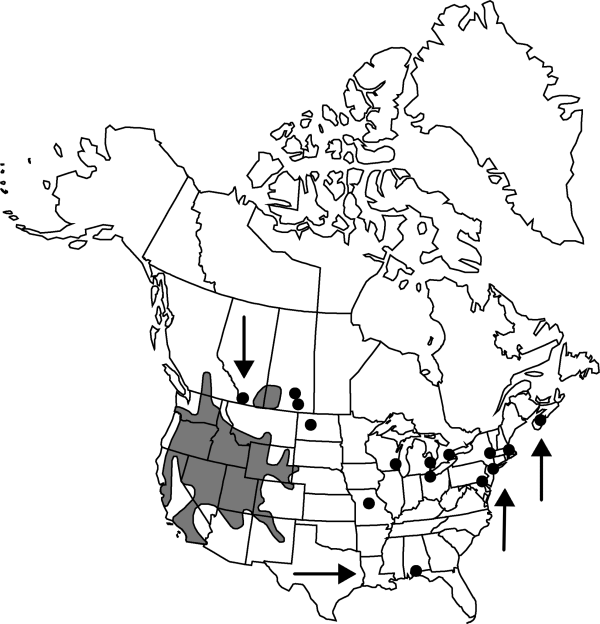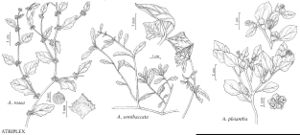Atriplex rosea
Sp. Pl. ed. 2, 2: 1493. 1763.
Herbs, erect, coarse, 1–10 (–20) dm. Stems simple or more commonly divaricately branching throughout, branches terete; herbage whitish scurfy to glabrate. Leaves alternate, short petiolate, blade prominently 3-veined, ovate to lanceolate, mainly 12–80 × 6–50 mm, margin irregularly sinuate-dentate and often subhastately lobed or rarely some entire, apex acute to obtuse. Flowers in axillary glomerules or interrupted terminal spikes. Staminate flowers with 4 or 5 sepals. Pistillate flowers in axillary glomerules of 5–10. Fruiting bracteoles prominently 3–5-veined, sessile or short stipitate, (3–) 4–6 (–10) mm and as wide, sometimes subhastately lobed at base, conspicuously dentate, sharply tuberculate to almost smooth on faces. Seeds dimorphic: brown, 2–2.5 mm wide, or black, 1–2 mm wide; radicle inferior. 2n = 18.
Phenology: Flowering mid summer–fall.
Habitat: Disturbed sites, often in riparian habitats or in barnyards or on animal bed grounds, along roadsides and irrigation canals, with juniper, sagebrush, rabbitbrush, pinyon-juniper, Salsola, Chrysothamnus, Atriplex spp., and other weedy species
Elevation: 0-2600 m
Distribution

Introduced; Alta., B.C., N.S., Ont., Sask., Ariz., Calif., Colo., Fla., Idaho, Mass., Mich., Mo., Mont., Nebr., Nev., N.J., N.Mex., N.Y., N.Dak., Ohio, Oreg., Pa., Utah, Wash., Wis., Wyo., Eurasia
Discussion
At least some early collections were from ballast dumps at harbors on both coasts. It seems probable that the plants were quickly spread inland from initial centers of introduction by birds and more recently along railroads.
Selected References
None.
Lower Taxa
"dm" is not declared as a valid unit of measurement for this property.
